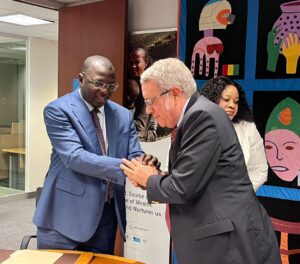By Joshua Worlasi AMLANU, Washington D.C
Ghana has signed a $260 million financial package with the World Bank to address critical challenges in its energy sector.
The agreement, comprising a US$250 million credit and a US$10 million grant, marks the country’s first energy sector partnership with the World Bank in Washington, D.C., in over two decades.
Dr. Mohammed Amin Adam, Minister for Finance, described the deal as a transformative step toward achieving a more sustainable and efficient energy sector.
Dr. Adam outlined the Energy Sector Recovery Program for Results (P4R) initiative, focusing on improving the financial viability of Ghana’s electricity distribution sector and increasing access to clean cooking solutions.

The programme targets pressing issues, including high distribution losses and low revenue collection rates, which together have cost Ghana approximately 2 percent of its GDP annually.
“This situation is unsustainable and needs to be urgently addressed,” he said, emphasizing that energy shortfalls alone have cost the country roughly US$1.2 billion this year .
The programme will include investments to enhance revenue collection and operational efficiency, with improvements like prepaid metering systems and advanced commercial management for distribution utilities.

These investments, according to Dr. Adam, are designed to strengthen infrastructure, lower operational costs, and contribute to a reliable energy supply chain, which can support Ghana’s economic growth.
“Our objective is not only to stabilize our energy sector but also to enhance the quality of life for our citizens,” he added.
Robert Taliercio, Country Director at the World Bank, highlighted the strategic goals of the P4R initiative, that many energy reform measures were incorporated into a strong energy pillar within the World Bank’s Development Policy Financing (DPF) series, and after moving through board approval in June and Ghana’s parliamentary approval in September, the agreement reached the ceremonial signing phase.
Mr. Taliercio elaborated on the P4R’s broader objectives, which include strengthening Ghana’s energy sector accountability and financial transparency. As part of the programme, between 600,000 and 1 million smart prepaid meters will be deployed, enhancing revenue collection and fostering transparency.
Additionally, the clean cooking component of the P4R will expand access to liquefied petroleum gas (LPG) across households, schools, and businesses, thereby promoting environmental sustainability and social equity.
“The P4R focuses on improvements in energy sector institutional capacity and accountability, introducing transparency, certainty, and predictability in the sector’s financial flows,” Mr. Taliercio said.

The reforms under the programme are expected to ensure long-term sustainability and align with Ghana’s national development goals, creating an environment that attracts investment and promotes productivity.
Dr. Adam cited the potential economic benefits, recalling an Institute of Statistical, Social and Economic Research (ISSER) study, which estimated that Ghana loses between US$320 million and US$924 million annually due to power crises.
With the economic recovery underway, he urged swift action to address energy sector issues, adding, “With a financially viable electricity distribution sector, we can exceed medium-term growth targets.”










